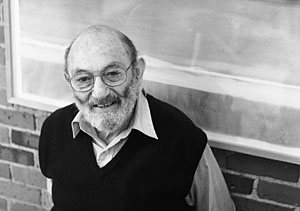
Fall
2000
![]()
Luminaries
Seven
notables contemplate the state of humanities, arts, and social sciences
at MIT and beyond.
![]()
![]()
Soundings is a publication of the School of Humanities, Arts, and Social Sciences at MIT
Comments and questions to shass-www@mit.edu
Linguistics at MIT: a personal view on how it all began

Photo:
Graham G. Ramsay
Morris Halle is Institute Professor of Linguistics Emeritus. He joined the MIT Faculty in 1951 and administered the Linguistics Program from 1961 to 1976.
In his prospectus for MIT, William Barton Rogers, MIT's first president, wrote in 1865 that the Institute would "furnish a general education, founded upon the Mathematical, Physical, and Natural Sciences, English and other Modern Languages, and Mental and Political Science, as shall form a fitting preparation for any of the departments of active life." For various reasons, the humanities and social sciences languished until the 1930's, when a Division of Humanities with three departments was established. These departments—Economics and Social Science, English and History, and Modern Languages—formed the core of the School of Humanities and Social Science, established in 1950 to develop what President Killian described as "a new humanism that rests upon both science and the liberal arts."
By a fortunate coincidence, I first set foot at MIT in 1950. I was then a Harvard graduate student studying under Roman Jakobson, one of the leading linguists of the 20th century, and the occasion that brought me to the Institute was the Speech Communication Conference.
At this meeting, Jakobson introduced me to William Locke, then Head of the MIT Department of Modern Languages, and to Jerome Wiesner, then Associate Director of the Research Laboratory of Electronics (RLE). Through these contacts, I was given access to RLE equipment useful to my dissertation research on Russian phonetics. This affiliation led to the establishment of a Speech Analysis group in RLE and to my appointment as assistant professor of modern languages.
My research arrangements had a most distinguished precedent at MIT. In 1871 Alexander Graham Bell came to Boston and called Lewis B. Monroe, MIT professor of vocal culture and elocution (sic!), who provided him with access to apparatus to study speech acoustics. Bell's research resulted in his winning the patent for the telephone. Though not quite as spectacular as Bell's, one of the results of my own early work, the monograph Preliminaries to Speech Analysis (1952), written jointly with Roman Jakobson and Gunnar Fant, had a significant impact on the field.
The MIT Department of Modern Languages was then largely a service department, offering elementary language subjects and practical courses to help graduate students pass their foreign language reading requirement. Bill Locke's plan for upgrading the department was to develop linguistics, and Frederic Bodmer, author of The Loom of Language, was appointed to teach some subjects in this area.
In 1955, when Bodmer was about to retire, I suggested to Bill Locke that the department hire as his replacement Noam Chomsky. Bill acted upon my advice, and Noam joined the MIT faculty.
One of Chomsky's first publications after coming to MIT was Syntactic Structures (1957), which evoked an enormous response, within linguistics proper and in neighboring disciplines. It constituted a direct challenge to the assumption that language is to be understood by focusing on its communicative function. This view was then especially strong at MIT, where the Wiener-Shannon Theory of Information was seen as a major breakthrough and the natural foundation for further language research.
In surroundings less hospitable to new ideas, Chomsky's challenge to the common wisdom would have evoked a negative reaction by the powers that be. This was not the case here. There was, of course, considerable debate of Chomsky's ideas, but at no point did the criticism have administrative consequences.
Thus, when the international response to Syntactic Structures led to many requests for information about the topics discussed in the book, the MIT administration responded by suggesting to Chomsky and me that we establish a PhD program in linguistics, which admitted its first students in 1961.
![]()
Copyright © 2000 Massachusetts
Institute of Technology